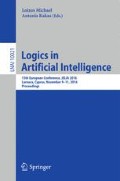Abstract
We address the semantics and normative questions for reasoning with presumptive arguments: How are presumptive arguments grounded in interpretations; and when are they evaluated as correct? For deductive and uncertain reasoning, classical logic and probability theory provide canonical answers to these questions. Staying formally close to these, we propose case models and their preferences as formal semantics for the interpretation of presumptive arguments. Arguments are evaluated as presumptively valid when they make a case that is maximally preferred. By qualitative and quantitative representation results, we show formal relations between deductive, uncertain and presumptive reasoning. In this way, the work is a step to the connection of logical and probabilistic approaches in AI.
Access this chapter
Tax calculation will be finalised at checkout
Purchases are for personal use only
References
Amgoud, L.: Postulates for logic-based argumentation systems. Int. J. Intell. Syst. 55(9), 2028–2048 (2014)
Amgoud, L., Caminada, M.: On the evaluation of argumentation formalisms. Artif. Intell. 172, 286–310 (2007)
Baroni, P., Caminada, M., Giacomin, M.: Review: an introduction to argumentation semantics. Knowl. Eng. Rev. 26(4), 365–410 (2011)
Benthem, J. van: Foundations of conditional logic. J. Philos. Logic 13, 303–349 (1984)
Besnard, P., García, A.J., Hunter, A., Modgil, S., Prakken, H., Simari, G.R., Toni, F.: Introduction to structured argumentation. Argument Comput. 5, 1–4 (2014)
Besnard, P., Hunter, A.: A logic-based theory of deductive arguments. Artif. Intell. 128, 203–235 (2001)
Bochman, A.: A Logical Theory of Nonmonotonic Inference and Belief Change. Springer, Berlin (2001)
Bondarenko, A., Dung, P.M., Kowalski, R.A., Toni, F.: An abstract, argumentation-theoretic approach to default reasoning. Artif. Intell. 93, 63–101 (1997)
Dawid, A.P.: Beware of the DAG! In: Guyon, I., Janzing, D., Schölkopf, B. (eds.) JMLR Workshop and Conference Proceedings. Causality: Objectives and Assessment (NIPS 2008 Workshop), vol. 6, pp. 59–86 (2010). jmlr.org
Dubois, D., Prade, H.: Possibility theory, probability theory and multiple-valued logics: a clarification. Ann. Math. Artif. Intell. 32(1), 35–66 (2001)
Dung, P.M.: On the acceptability of arguments and its fundamental role in nonmonotonic reasoning, logic programming and n-person games. Artif. Intell. 77, 321–357 (1995)
Eemeren, F. H. van, Garssen, B., Krabbe, E.C.W., Henkemans, A.F.S., Verheij, B., Wagemans, J.H.M.: Argumentation in artificial intelligence. In: Eemeren, F. H. van, et al. (eds.) Handbook of Argumentation Theory. Springer, Berlin (2014)
García, A.J., Simari, G.R.: Defeasible logic programming: an argumentative approach. Theory Pract. Logic Program. 4(2), 95–138 (2004)
Hunter, A.: A probabilistic approach to modelling uncertain logical arguments. Int. J. Approx. Reason. 54, 47–81 (2012)
Hunter, A.: Probabilistic qualification of attack in abstract argumentation. Int. J. Approx. Reason. 55, 607–638 (2014)
Kraus, S., Lehmann, D., Magidor, M.: Nonmonotonic reasoning, preferential models and cumulative logics. Artif. Intell. 44, 167–207 (1990)
Li, H., Oren, N., Norman, T.J.: Probabilistic argumentation frameworks. In: Modgil, S., Oren, N., Toni, F. (eds.) TAFA 2011. LNCS, vol. 7132, pp. 1–16. Springer, Heidelberg (2012)
Makinson, D.: General patterns in nonmonotonic reasoning. In: Gabbay, D.M., Hogger, C.J., Robinson, J.A. (eds.) Handbook of Logic in Artificial Intelligence and Logic Programming, Nonmonotonic Reasoning and Uncertain Reasoning, vol. 3, pp. 35–110. Clarendon Press, Oxford (1994)
Modgil, S., Prakken, H.: A general account of argumentation with preferences. Artif. Intell. 195, 361–397 (2013)
Pollock, J.L.: Defeasible reasoning. Cogn. Sci. 11(4), 481–518 (1987)
Pollock, J.L.: Cognitive Carpentry: A Blueprint for How to Build a Person. The MIT Press, Cambridge (1995)
Prakken, H.: An abstract framework for argumentation with structured arguments. Argument Comput. 1(2), 93–124 (2010)
Roberts, F.S.: Measurement Theory with Applications to Decisionmaking, Utility, and the Social Sciences. Cambridge University Press, Cambridge (1985)
Russell, S.: Unifying logic and probability. Commun. ACM 58(7), 88–97 (2015)
Simari, G.R.: On the properties of the relation between argumentation semantics and argumentation inference operators. In: Parsons, S., Oren, N., Reed, C., Cerutti, F. (eds.) Computational Models of Argument, Proceedings of COMMA 2014, pp. 3–8. IOS Press, Amsterdam (2014)
Thimm, M.: A probabilistic semantics for abstract argumentation. In: Proceedings of the European Conference on Artificial Intelligence (ECAI 2012), pp. 750–755. IOS Press, Amsterdam (2012)
Toulmin, S.E.: The Uses of Argument. Cambridge University Press, Cambridge (1958)
Verheij, B.: Argumentation and rules with exceptions. In: Computational Models of Argument: Proceedings of COMMA 2010, Desenzano del Garda, Italy, 8–10 September 2010, pp. 455–462. IOS Press, Amsterdam (2010)
Verheij, B.: Jumping to conclusions. In: del Cerro, L.F., Herzig, A., Mengin, J. (eds.) JELIA 2012. LNCS, vol. 7519, pp. 411–423. Springer, Heidelberg (2012)
Verheij, B.: Arguments and their strength: revisiting Pollock’s anti-probabilistic starting points. In: Parsons, S., Oren, N., Reed, C., Cerutti, F. (eds.) Computational Models of Argument. Proceedings of COMMA 2014, pp. 433–444. IOS Press, Amsterdam (2014)
Verheij, B.: To catch a thief with and without numbers: arguments, scenarios and probabilities in evidential reasoning. Law Probab. Risk 13, 307–325 (2014)
Verheij, B., Bex, F.J., Timmer, S.T., Vlek, C.S., Meyer, J.J., Renooij, S., Prakken, H.: Arguments, scenarios and probabilities: connections between three normative frameworks for evidential reasoning. Law Probab. Risk 15, 35–70 (2016)
Author information
Authors and Affiliations
Corresponding author
Editor information
Editors and Affiliations
Rights and permissions
Copyright information
© 2016 Springer International Publishing AG
About this paper
Cite this paper
Verheij, B. (2016). Correct Grounded Reasoning with Presumptive Arguments. In: Michael, L., Kakas, A. (eds) Logics in Artificial Intelligence. JELIA 2016. Lecture Notes in Computer Science(), vol 10021. Springer, Cham. https://doi.org/10.1007/978-3-319-48758-8_31
Download citation
DOI: https://doi.org/10.1007/978-3-319-48758-8_31
Published:
Publisher Name: Springer, Cham
Print ISBN: 978-3-319-48757-1
Online ISBN: 978-3-319-48758-8
eBook Packages: Computer ScienceComputer Science (R0)

